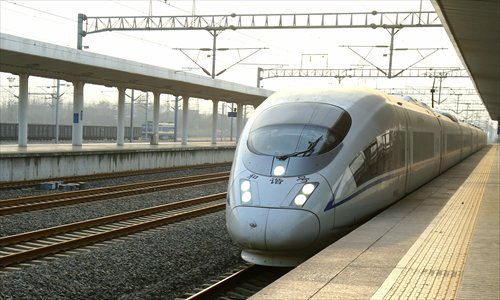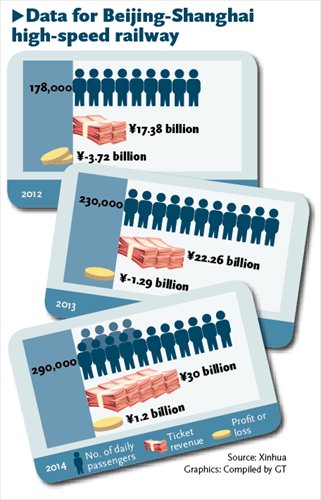HOME >> BUSINESS
Beijing-Shanghai high-speed railway to post annual profit
By Hu Weijia Source:Global Times Published: 2015-1-26 23:38:02
Results may not be repeated by other lines, experts warn

A Shanghai-bound high-speed train at Liuan station in East China's Anhui Province Photo: CFP

Graphics: GT
The Beijing-Shanghai high-speed railway is expected to report an annual profit of 1.2 billion yuan ($192 million) in 2014, according to a media report, but experts warned on Monday that the same success may not be seen with other high-speed rail lines.
More than 100 million passengers traveled on the Beijing-Shanghai high-speed railway in 2014, a rise of 27 percent year-on-year, providing 30 billion yuan in ticket revenue, the Xinhua News Agency reported on Sunday.
Factoring in business tax calculations, the railway will post an annual profit of 1.2 billion yuan for 2014, the first annual profit since it went into operation on June 30, 2011, it said.
This would mean it has only taken three years for the railway to start making a profit, better than the previously anticipated target of five years, the report said, citing Cai Qinghua, former chairman of Beijing-Shanghai High-speed Railway Corp, which operates the railway.
The better-than-expected results came amid a rapid increase in passenger numbers for the railway, which crosses some of the country's most developed regions where there is huge demand for travel, Zhang Zhuting, a professor at the Transport Management Institute under the Ministry of Transport, told the Global Times on Monday.
Built with investment of around 209 billion yuan, the 1,318 kilometer railway allows people to travel from Beijing to Shanghai in less than six hours, a huge improvement from the standard rail trip, which takes more than 10 hours.
It's efficient to take the railway instead of flying, as it is cheaper and the trip will not be affected by bad weather, Jiang Li, a businessman who often travels between Beijing and Shanghai, told the Global Times on Monday.
The advantages compared to flying have helped the railway become profitable two years ahead of time, but it doesn't mean the 209 billion yuan in investment has been recouped, Zhang said, noting that the annual profit only signifies the difference between revenue and expenditure each year.
"The Beijing-Shanghai high-speed railway achieved profits ahead of schedule due to its large traffic flow. The success may not be repeated by other high-speed railways, especially those in the central and western regions that are less densely populated and less developed," Zhao Jian, a professor at Beijing Jiaotong University, told the Global Times on Monday.
The construction of high-speed railways in central and western regions should be planned based on development of the local economy and real travel demand, Zhao said.
The investment into the Beijing-Shanghai high-speed railway and its interest is scheduled to be paid off in 14 years after the railway first reports an annual profit, Cai was quoted by the Xinhua report as saying.
According to a report released in May 2013 by US-based research organization Reason Foundation, the majority of high-speed railways worldwide require large government subsidies and only two of them are profitable: Paris-Lyon in France and Tokyo-Osaka in Japan.
The construction costs for high-speed railways are usually two or three times higher than for ordinary railways, and high operating expenses make it hard for high-speed railways to be profitable, Zhao noted.
But Zhao said the investment efficiency of Chinese high-speed railway projects is higher than that of such projects in other countries and regions.
According to a research report released by the World Bank in July 2014, China's railway network has been built at a relatively low unit cost compared with similar projects elsewhere.
"China's high-speed railway, which has a maximum speed of 350 kilometers per hour, has a typical infrastructure unit cost of about $17-21 million per kilometer, with a high ratio of viaducts and tunnels. The cost of high-speed railway construction in Europe, with a speed of 300 kilometers per hour or above, is estimated to be of the order of $25-39 million per kilometer," the World Bank report said.
In terms of high-speed railway length, China also leads the world with 16,000 kilometers in operation by the end of 2014, covering 28 out of 31 provincial regions in the country, the Xinhua report said.
China's high-speed rail technology is reliable and the costs are low, giving the country an advantage in exporting the technology to other countries, Zhao noted.
Posted in: Industries